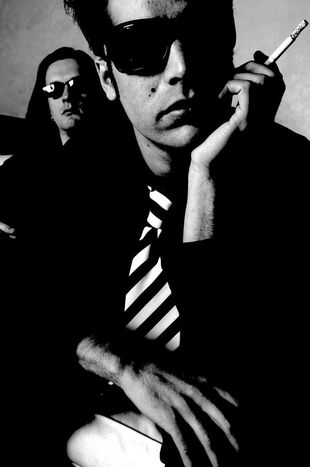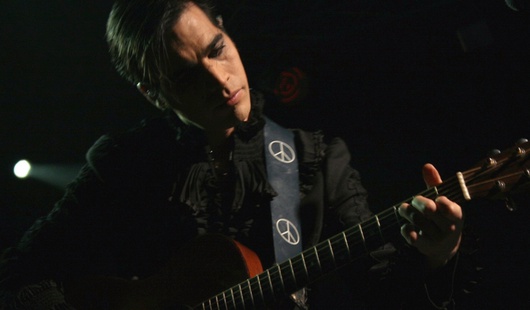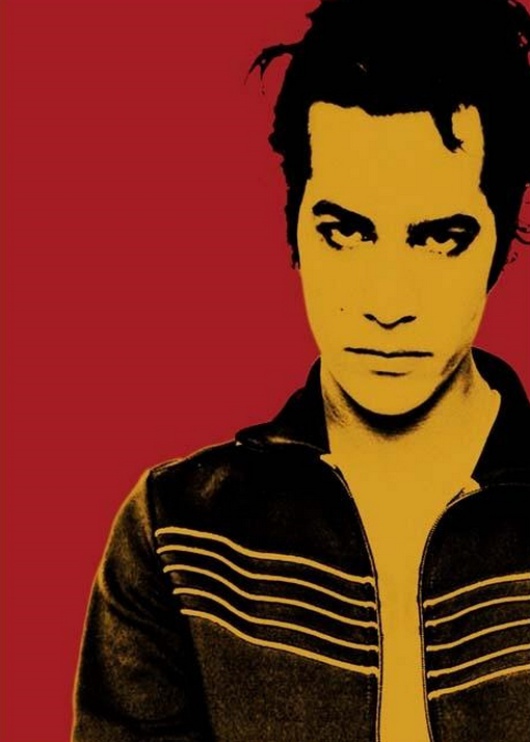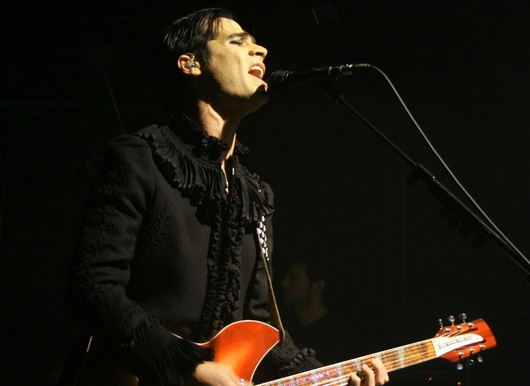
Aviv Geffen: 'Israel is a paranoid country'
Published on
Translation by:
 francesca reinhardt
francesca reinhardt
Hopeful sounds from Israel: the 35 year old pop singer was one of the first conscientious objectors in Israel. Today, he sings about peace in the Middle East and wants to lend a voice to a 'new generation' with his songs
Without body guards or a bullet-proof vest, the small, wiry pop singer arrives at Berlin’s Postbahnhof, an historic train station converted into a music venue. With his black patent shoes, he hastily stubs out his cigarette and settles himself in the spotlight of the television cameras. His voice sounds worn out and he answers the journalist’s questions routinely. No one asks about his music, not even the two and half million albums sold.
 The singer was invited to Germany as a peace ambassador, a role he clearly enjoys. 'I love speaking about politics, I’m not really an entertainer.' In his native Israel, Aviv Geffen would not be able to chat and give answers so openly. Through his harsh criticism of the Israeli policy of occupation, the 35-year old has earned many enemies in the last few years.
The singer was invited to Germany as a peace ambassador, a role he clearly enjoys. 'I love speaking about politics, I’m not really an entertainer.' In his native Israel, Aviv Geffen would not be able to chat and give answers so openly. Through his harsh criticism of the Israeli policy of occupation, the 35-year old has earned many enemies in the last few years.
'I’m the biggest rebel in Israel,' says Geffen with a steady voice and a certain pride. 'In Israel the young people don’t trust themselves to open their mouths. I’m not afraid of dying though.' Aviv Geffen belongs to the few who have opened their mouths, and very wide at that. Since the assassination of the then Israeli prime minister and Nobel prize winner, Yitzhak Rabin, he sees his music as a 'weapon of peace.'
Geffen and Rabin were standing together on stage at a peace demonstration in Tel Aviv, when Jigal Amir, a Jewish fundamentalist, shot the prime minister. 'It was the most dramatic moment of my life. I was the last person to put my arms around him. For us, Rabin embodied the hope of peace.' Since then, the Israeli pop-singer has taken on Rabin’s legacy in his own way. His song To Cry for You has become a synonym for the assassination of Rabin; another song, Hayeled Shel Koulanu, is dedicated to the prime minister and the Israeli soldier Gilad Shalit, taken prisoner by Hamas (who run the Palestinian territory, and are recognised by the EU as a terrorist organisation - ed) in the Gaza conflict over two years ago.
 And the Israeli pop-icon does indeed support the recent military offensive involving heavy bombardment. 'I know that (current Israeli PM Ehud) Olmert has done everything to prevent this attack through dialogue, it was unavoidable. In Europe people have developed their views, without knowing what it really means to have missiles flying overhead every day.' However, he thinks that the military offensive has lasted far too long and caused far too many casualties. Now, under the auspices of the United States, Russia, and China, there has to be serious dialogue, and a deal to enforce the division of land.
And the Israeli pop-icon does indeed support the recent military offensive involving heavy bombardment. 'I know that (current Israeli PM Ehud) Olmert has done everything to prevent this attack through dialogue, it was unavoidable. In Europe people have developed their views, without knowing what it really means to have missiles flying overhead every day.' However, he thinks that the military offensive has lasted far too long and caused far too many casualties. Now, under the auspices of the United States, Russia, and China, there has to be serious dialogue, and a deal to enforce the division of land.
'The Israeli settlements in Palestinian autonomous areas are like a cancer in the body of Israel. The people live there not for religious reasons, but because the state subsidises them. We don’t need these areas and should give East Jerusalem to the Palestinians,' argues Geffen, who identifies himself with the 'extreme left wing of Israeli politics.'
 Although his political messages do not sell well in Israel, a country with military service for men and women, Geffen is still a pop star with the highest record sales and, according to the German daily Die Welt, has sold more albums than British band Coldplay. With his androgynous appearance, he likes to provoke Israel’s conservatives from the stage, calling for an anti-macho movement which discriminates against no one. 'Israel is a paranoid country where people think they always have to be strong, that’s a mistake.' His music is not always political, but in the last few years has been more soft and melancholy, English heartache music. 'My new songs are aimed at young people all over the world, they are about love, drugs, and violence,' says Geffen, who would like to break through in Europe with his new album.
Although his political messages do not sell well in Israel, a country with military service for men and women, Geffen is still a pop star with the highest record sales and, according to the German daily Die Welt, has sold more albums than British band Coldplay. With his androgynous appearance, he likes to provoke Israel’s conservatives from the stage, calling for an anti-macho movement which discriminates against no one. 'Israel is a paranoid country where people think they always have to be strong, that’s a mistake.' His music is not always political, but in the last few years has been more soft and melancholy, English heartache music. 'My new songs are aimed at young people all over the world, they are about love, drugs, and violence,' says Geffen, who would like to break through in Europe with his new album.
For now, hundreds of fans and enthusiasts are gathered to see him at Berlin’s Postbahnhof. Here and there shouting and cheering in Hebrew rings out from the hum of voices as Aviv Geffen takes the stage. His new song Heroes is dedicated to the victims of war, on both Israeli and Palestinian sides. It is about soldiers who die unnecessarily, only to be posthumously honoured as heros: Dont send your boy, when the country calls you.
This is a provocative message in a country where the majority of the population sees the military as the only guarantee of its existence. Geffen's music is not new; it is English language pop music in the style of U2 or Depeche Mode. What is new is that an Israeli singer wearing a T-shirt that says 'love' can take his mission of peace before such a big audience. Punching the air, he reveals the tatoo on his upper arm: a big peace symbol.
Translated from Aviv Geffen: „Wir sollten Schminke tragen, statt Uniformen!“


